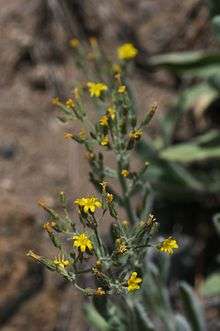Hieracium horridum
| Hieracium horridum | |
|---|---|
 | |
| Scientific classification | |
| Kingdom: | Plantae |
| (unranked): | Angiosperms |
| (unranked): | Eudicots |
| (unranked): | Asterids |
| Order: | Asterales |
| Family: | Asteraceae |
| Genus: | Hieracium |
| Species: | H. horridum |
| Binomial name | |
| Hieracium horridum Fr. 1862[1] | |
 | |
| Hieracium horridum distribution | |
| Synonyms | |
Hieracium horridum,[4] known as the prickly hawkweed[1] or shaggy hawkweed, gets its name from the long, dense, shaggy white to brown hairs (trichomes) which cover all of the plant parts[5] of this plant species.[6] The species is native to Oregon, California, and Nevada in the western United States.[7][8]
Hieracium horridum possesses oblong leaves along the stems of this 4 inches (10 cm) to 15 inches (38 cm) tall hairy plant with 11-12 bright yellow flower heads at the top[5] of each flower head, which is 0.315 inches (8 mm) to 0.354 inches (9 mm) in diameter.[9] It flowers between late June and August.
Like all members of the Asteraceae family, the flowers are actually florets made up of many ray corolla, each ray its own stamen. As with other plants of the tribe Cichorieae, the stems and leaves produce a milky substance when broken.[10]
Distribution
Hieracium horridum's habitat is in dry rocky places within mountainous coniferous forests[4] in Oregon, California and Nevada[1][6] at elevations between 5,000 feet (1,524 m) and 12,000 feet (3,658 m).[5]
References
- 1 2 3 Natural Resources Conservation Service (2007). "PLANTS Profile for Hieracium horridum Fr. prickly hawkweed". The PLANTS Database. USDA, Baton Rouge, LA 70874-4490 USA. Retrieved 2007-12-26.
- ↑ Missouri Botanical Garden (2007). "Tropios beta: details for Hieracium horridum Fr.". Missouri Botanical Garden. Retrieved 2007-12-26.
- ↑ International Plant Names Index. "Plant Name Details Hieracium horridum". Retrieved 2007-12-26.
- 1 2 Charters, Michael L. "Shaggy Hawkweed". Wildflowers and Other Plants of Southern California. Retrieved 2007-12-26.
- 1 2 3 Niehaus, Theodore F. (1976). "Pacific States Wildflowers". Peterson Field Guide. The Peterson Field Guide Series. Illustrations by Charles L. Ripper. New York: Houghton Mifflin Company. p. 220. ISBN 0-395-91095-1.
- 1 2 Germplasm Resources Information Network. "Taxon: Hieracium horridum Fr.". (GRIN) Online Database. USDA, ARS, National Genetic Resources Program. Retrieved 2007-12-26.
- ↑ Calflora taxon report, University of California, Hieracium horridum Fries Shaggy Hawkweed, prickly hawkweed
- ↑ Biota of North America Program 2014 county distribution map
- ↑ Flora of North America. "Hieracium horridum Fries, Uppsala Univ. Årsskr. 1862". Flora of North America North of Mexico. New York and Oxford: Flora of North America Association. 19, 20 and 21: 278, 283, 292. Retrieved 2007-12-26.
- ↑ Mrs M. Grieve (1933). "Hawkweed, Wood". A Modern Herbal. botanical.com. Retrieved 2007-12-16.
External links
- Integrated Taxonomic Information System (ITIS). "Standard Report Hieracium horridum Fries". Retrieved 2007-12-26.
- Flora oder Allgemeine botanische Zeitung (45 ed.). Missouri Botanical Garden. 1862. Retrieved 2007-12-26.
- Elna Sunquist Bakker; Robert Jan 'Roy' van de Hoek (2003–2005) [1919]. "The Flora of the Pine Belt of the San Antonio Mountains of Southern California". Plant World. Archived from the original on 2007-10-28. Retrieved 2007-12-26.
- Tom Chester; James Dillane; Jane Strong (2002–2007). "Plant Guide to Devils Slide Trail, San Jacinto Mountains". tchester.org. Retrieved 2007-12-26.
This is a working list, about which we make no guarantees at all until we officially release it. Use at your own risk!
- Sierra Nevada Field Campus, San Francisco State University. "FLORA". Preliminary list of species within a 60 mile radius of Sierra Nevada Field Campus. Archived from the original on 2007-09-02. Retrieved 2007-12-26.
- Grossi, Mark (September 2000). "Longstreet Highroad Guide to the California Sierra Nevada". California Sierra Nevada Book:Devils Postpile National Monument. Decatur, GA: Lenz Design. pp. Rainbow Falls. ISBN 1-56352-592-5. Retrieved 2007-12-26.